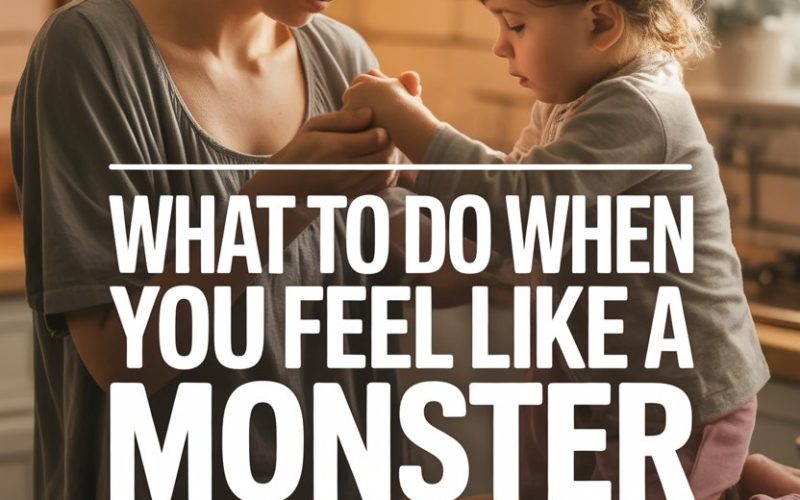Some days, you’re the bedtime-story whisperer, the snack magician, the finder of lost teddies.
Other days, well… you’re the one hissing, “Why can’t you EVER just eat your peas?” through gritted teeth while Googling “Is it normal to fantasize about running away to a quiet cave?”
Welcome to the club—population: almost every parent you know.
If you’ve ever felt like a Monster Mom, trust me, you’re less a hideous beast and more like a sleep-deprived human doing her best.
Let’s talk about what actually helps when you’re convinced you’ve sprouted metaphorical horns and claws.
Everyone Has Monster Moments
That mum in the school car park who looks like she’s permanently levitating on zen energy? She’s had her own “monster” moments, too.
Maybe she just hides hers better, or maybe she’s invested in noise-cancelling headphones and a good therapist.
Research from the Pew Research Center shows most parents feel overwhelmed or frustrated sometimes. You’re not broken or uniquely unfit; you’re just riding a particularly rickety section of the rollercoaster.
Spotting Your Triggers
No one morphs into Monster Mom out of nowhere. Usually, it’s a combo platter: lack of sleep, a whingeing toddler, work emails pinging away, and someone’s just poured milk on your favourite jumper.
Noticing what sets you off helps you prepare (or at least brace yourself). The next time you feel your inner Godzilla stirring, take a beat.
it the sixth request for biscuits before 8am? Or perhaps three days running of skipped showers?
Jotting a few notes on your phone can reveal patterns. You might discover it’s always the morning rush, or mealtime mayhem, that pushes you over the edge.
Armed with this info, you can start changing routines—or, at the very least, lower your expectations for yourself during those times.
You’re Not Your Worst Moment
That one time you lost it and snapped at your child? It doesn’t define you forever. No plaque will be erected in your honour reading “She Yelled During the School Run, 2024.”
Children are wildly resilient. In fact, experts say it’s less about never messing up and more about what you do next.
The “rupture and repair” model, championed by child psychologist Dr. Daniel Siegel, shows that repairing after a blowup—apologising, reconnecting, showing you’re human—builds trust and actually strengthens your bond.
If only grown-up relationships worked as well, right?
Apologising Is Powerful
You don’t lose your “mum authority” by saying sorry. In fact, you show your kid that mistakes are part of being human, and that making up matters.
Try: “Mummy was tired and cranky and shouted. That wasn’t kind. I’m sorry.” Watch your child’s shoulders drop. Often, you’ll both feel lighter.
Researchers at the University of Michigan found that parental apologies help kids develop emotional intelligence and self-worth. Who knew the magic words weren’t just “Please” and “Thank you”?
Self-Compassion Isn’t Selfish
Treating yourself like you’d treat your best mate—yes, even when you’ve just lost your temper—can help you bounce back more quickly.
Self-compassion isn’t some airy-fairy concept; Dr. Kristin Neff, a pioneering researcher in this area, found that parents who are kinder to themselves are less likely to spiral into guilt or shame and more likely to try new solutions.
That might mean taking five minutes to breathe in the loo (lock the door), or texting a friend with a mortifying confession (“Just threatened to throw Peppa Pig out the window. Please send help.”).
You deserve the same love you pour into everyone else.
Lower the Bar (No, Lower… Even Lower)
Those parenting books with their “engaged presence” and “screen-free play”? Lovely in theory. But real life is more sticky-floors and “just one more Bluey episode so I can finish the laundry.”
Perfection isn’t possible. Not for you, not for your child, not even for that Instagram mum with the immaculate white sofa (it’s all filters and bribery, promise).
Ask yourself: what really matters to you today? Kindness? Getting through the afternoon without a meltdown? A hot cuppa drunk while it’s still actually hot?
Pick one. Call it a win.
Give Your Brain a Timeout
You know that “just go away for five minutes!” feeling? Turns out, your brain needs breaks, too.
Stepping outside for a few deep breaths, blasting your favourite song in the kitchen, or even locking yourself in the bathroom with a chocolate bar—these micro-breaks can reset your frazzled nerves.
A study from the University of Illinois found that even short mental breaks can boost focus and mood. No need to book a spa day (as if). Five minutes is enough to put the “mum” back in “human.”
Find Your People
Parenting can feel isolating, especially when you’re convinced you’re the only one who’s ever shouted, “If you lick your brother again, I’m cancelling Christmas!”
Connecting with other parents who get it—whether at the playground, online, or the WhatsApp group for your child’s class—can be a sanity-saver. Vent, compare war stories, laugh about yesterday’s disaster.
If friends and family aren’t nearby, parenting forums like Mumsnet or local Facebook groups offer a safe space to share your “monster” moments and get support from people who’ve been there.
Quick Tricks for Re-Entry After a Blowup
Once the storm has passed, what now? You might feel like hiding under the duvet, but your child is probably already over it (children seem to bounce back faster than freshly laundered socks).
Try these:
- Offer a cuddle, even if you’re still prickly. Physical closeness says, “We’re okay.”
- Make a silly face or joke—laughter can be the best reset button.
- Draw together or build a quick fort out of cushions. Play, even for a few minutes, repairs connection faster than a heart-to-heart.
- For older children, talk it out: “We both got upset before. Is there anything you want to say?”
You’re teaching your child something precious: it’s okay to feel big feelings, and there’s always a way back to each other.
When to Ask for More Help
Some days, the monster feelings don’t fade, even after the apologies and the chocolate. If you find yourself snapping all the time, struggling to get out of bed, or feeling hopeless, it might be more than just an off week.
Nearly 1 in 5 mums experiences postnatal depression or ongoing mental health challenges, according to the NHS.
If your feelings are getting heavy, it’s absolutely okay to talk to your GP or a mental health professional. That’s strong parenting, not a failure.
Celebrating Small Victories
Did you manage to crack a smile before your first coffee? Did the kids wear mostly clean clothes today? Did no one end up in A&E?
Celebrate. Life with children is a string of tiny, unsung triumphs.
Start a “Daily Win” jar—scraps of paper where you jot what went well today (even if it’s “No one cried over the wrong-colour bowl”). On the tough days, pull one out.
You’ll see: the monster moments are far outnumbered by the good ones.
Real Monsters Can’t Love Like This
You wouldn’t be reading this if you didn’t care. Monsters don’t feel guilt, or worry, or try to do better tomorrow. Monster Moms? They’re imaginary.
Real mums have rough days. Real mums also have soft hearts, stubborn hope, and the ability to laugh at yesterday’s disaster.
That’s what makes you a hero, not a beast.
Next time you feel those horns poking through, remember: you’re not alone, you’re not ruined, and you’re definitely not a monster.
More like a real, messy, gloriously human mum, doing the job that truly matters—with or without the odd roar.




